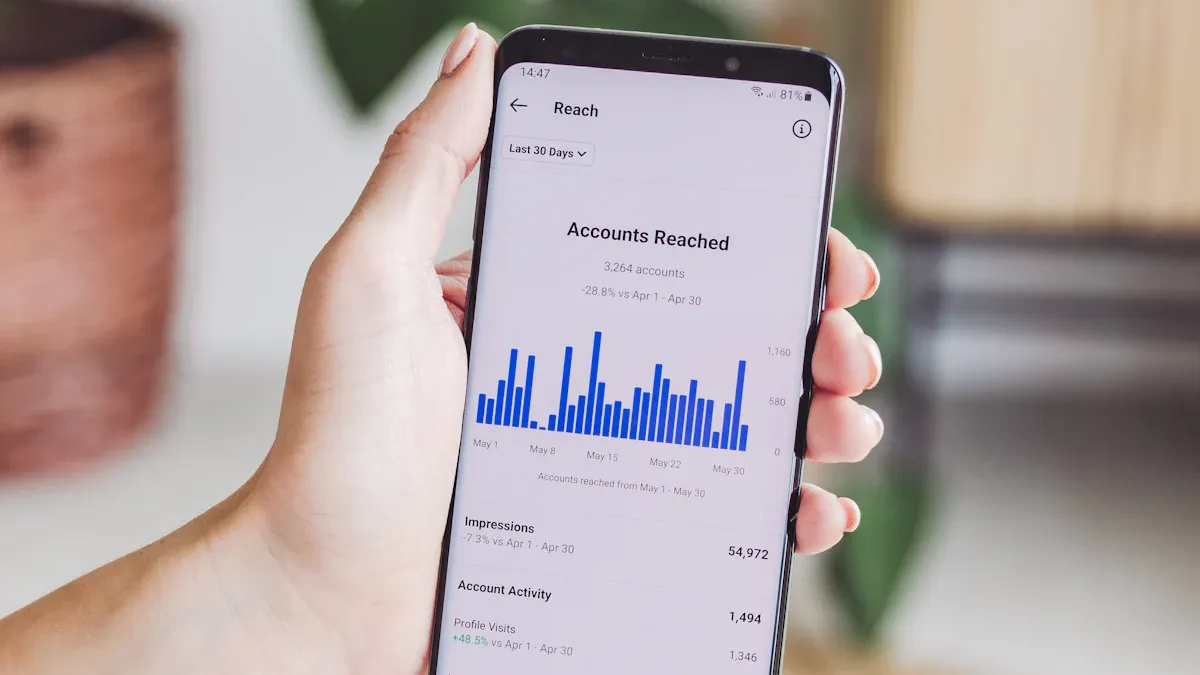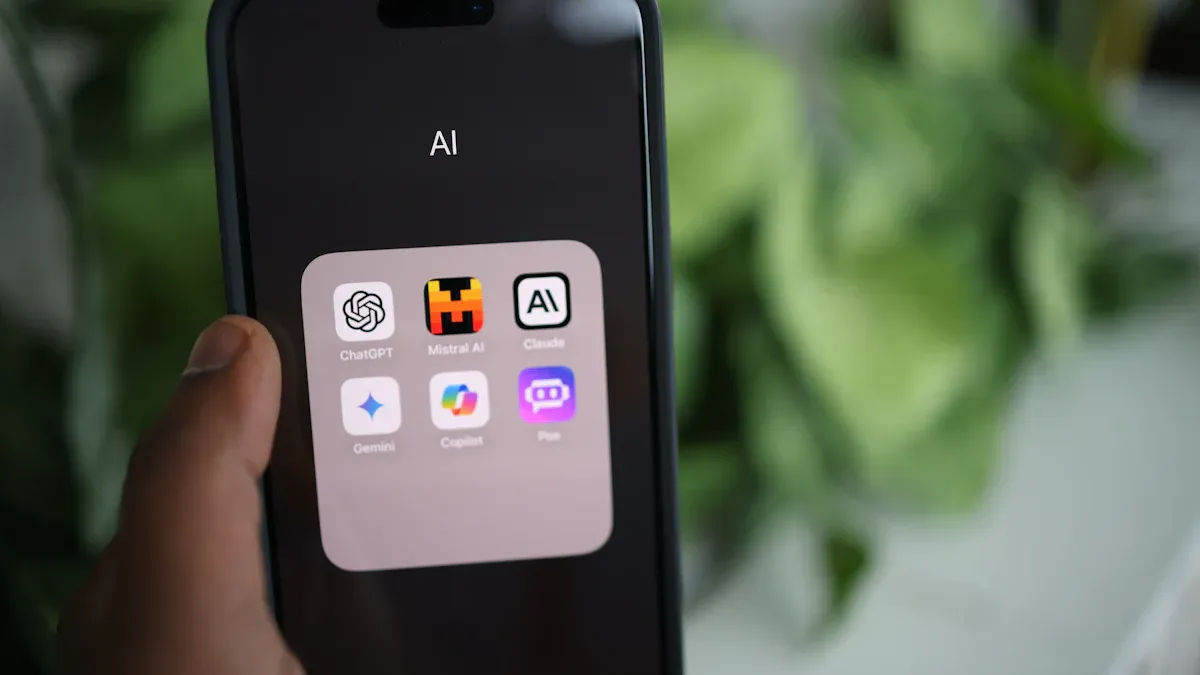Using AI to Optimize Ads for Mobile Users

Artificial intelligence is changing how mobile ads work for users by helping to optimize ads. It studies lots of data to make ads work better. Mobile users now make 60-70% of digital ad clicks. Mobile ads get 2-3 times more sales than PC ads, which shows why ads should be made for mobile devices. Companies using AI to optimize ads see 30% more sales from their ads. They also spend 25% less money to get new customers. AI is improving where ads go and how well they perform.
Key Takeaways
AI improves mobile ads by choosing better spots and targets, boosting sales by 30%.
AI makes custom ads that grab attention, raising user interest by 75%.
AI changes ads quickly, helping companies like PepsiCo earn $53 million more.
Predictive tools help find the right audience, increasing ad success by 31%.
AI runs A/B tests faster and better, making ads work their best.
The Impact of AI on Mobile Advertising

Changing how ads are placed
AI has changed how ads are placed online. It looks at lots of data to find the best times and places for ads. For example, it uses predictions to guess bid prices and competition. This helps ads reach the right people at the right time. Tools like Google Ads use AI to make mobile-friendly ads faster and better. Instagram Ads uses AI to show ads based on what users do and when they do it. This makes ads more visible and effective.
"We use AI in many ways. Predictive modeling helps us decide bids." - Jacky Ma, Director of Data Science at Remerge
These tools help make ads work better and bring in more money.
Making ads more engaging with AI
AI helps make ads more interesting for people. It personalizes ads so they match what people like. For example, HubSpot’s AI tools create ads that people want to click on. This increases how often people interact with ads. AI can also change ads quickly based on what users do. Studies show personalized ads make people 75% more likely to check out other content.
By making ads personal, AI helps people see ads they care about. This improves how well ads work.
How AI helps mobile advertising
AI is very important for mobile ads. It uses machine learning to study data and place ads smartly. Programmatic advertising, powered by AI, makes ad placement and targeting better. As mobile ads grow, more companies will use AI for marketing. Experts think this will grow by 37% from 2023 to 2025.
Using AI in marketing helps you follow trends, reach your audience, and improve ads.
Strategies to Optimize Ads with AI
Personalizing ad content using AI
AI helps you make ads that connect with people. It studies what users like and creates content they enjoy. This is called hyper-personalization, making ads feel more relevant. For example, Coca-Cola uses AI to make custom ads, finding chances traditional methods miss. Research shows personalized ads increase order value by 40% and engagement by 83%.
You can also change ads instantly based on user actions. This method gives users what they need right away. It helps you get better results from your ad budget. Campaigns using AI for content changes see 41% more conversions, proving this strategy works well.
Using predictive modeling for smarter targeting
Predictive modeling helps guess what users will do next. AI looks at data to find patterns and create target groups. This helps focus on people most likely to interact with ads. Data from mobile carriers gives extra insights to improve ad strategies.
Adidas used predictive tools in its bidding system. This improved ad returns by 31% and cut costs by 19%. These results show how predictive modeling makes targeting better and boosts success.
Optimizing ad placement in real time
Quick changes are key for mobile ads. AI tracks how ads perform, like clicks and conversions. It lets you adjust ads right away to improve results. For example, AI can tweak designs or move resources to work better.
Metric | What It Means |
|---|---|
How many people click on an ad after seeing it. | |
Conversion Rates | How many people take action after interacting with an ad. |
Return on Ad Spend | Money earned for every dollar spent on ads. |
PepsiCo used AI to adjust its ad budget. This led to a $53 million boost in yearly revenue. These examples show how real-time changes can improve your ad strategy and results.
Automating A/B Testing with AI
A/B testing compares two ad versions to find the better one. Doing this manually takes time and can cause mistakes. AI makes testing faster, easier, and more accurate for mobile ads.
AI quickly checks ad copies by studying lots of data. It spots trends and patterns people might miss. For example, AI finds which ad design or message gets more clicks. This saves time and improves ad performance without wasting resources.
AI’s real-time adjustments are a big advantage. It watches how ads perform and changes them instantly. If one ad isn’t doing well, AI switches to the better one. This helps you get the best results and improve your ad strategy.
Here’s how AI improves A/B testing:
Benefit | What It Does |
|---|---|
AI studies huge amounts of data quickly for faster decisions. | |
Improved Accuracy | AI avoids human mistakes, making test results more reliable. |
Enhanced Targeting | AI uses machine learning to target audiences better and adjust ads in real time. |
Personalized Content | AI creates ads that match user preferences for better engagement. |
Dynamic Optimization | AI changes ad strategies based on live data to improve timing and placement. |
AI handles the hard work of A/B testing so you can focus on better ads. This saves time and ensures your mobile ads perform their best.
Tools for AI-Driven Ad Placement
AI-powered platforms for mobile advertising
AI tools make mobile ads easier and better. They handle hard tasks and improve how ads work. These tools use AI to study data and make ads perform well. For example, Google Ads creates mobile-friendly ads automatically. Facebook Ads helps find the right audience for your ads. AdMob uses smart predictions to make campaigns more successful.
Here’s how these platforms help with mobile ads:
Use Case | Example | Benefit |
|---|---|---|
Automated Ad Creation | Google Ads | Saves time and makes ads fit mobile screens, boosting clicks and sales. |
Audience Targeting | Facebook Ads | Makes ads more relevant and increases user interest. |
Predictive Analytics | AdMob | Helps make smarter choices for better ad results. |
Dynamic Ad Placement | Instagram Ads | Shows ads at the best time and place for impact. |
Content Personalization | HubSpot | Creates ads that match user likes, improving clicks and sales. |
These tools save time, cut costs, and make ads work better for users.
Programmatic advertising and its benefits
Programmatic advertising uses AI to buy and place ads automatically. It helps ads reach the right people at the right time. This method uses real-time bidding to target users better. By studying data, it changes campaigns to improve results.
Here are some success stories with programmatic advertising:
Advertiser | Key Results |
|---|---|
Hestan Culinary | |
Kellogg Company | Raised ad visibility from 56% to over 70% |
Telemedicine Company | Got 300% more money back from ads |
These examples show how programmatic ads improve results and save money. Using this method can make your ads more effective.
Tools for analyzing user behavior and engagement
Knowing what users like is key to making good ads. AI tools study user age, interests, and actions to create ads they enjoy. Real-time updates let you change targeting and bids to reach the right people. For example, a tool used by the South China Morning Post made readers 75% more likely to click on another article by showing personalized suggestions.
Here’s how AI tools help with mobile ads:
Study user details to make ads they like.
Change targeting and bids instantly for better results.
Use data to spend money wisely on top-performing ads.
Using these tools makes ads better and improves user experience.
Real-World Success Stories

Examples of AI-powered ad success
AI has changed how businesses succeed with mobile ads. Companies like Lacoste and Sporijinal have achieved great results using AI.
Company | Achievement |
|---|---|
Lacoste | |
Sporijinal | 7.1x revenue growth from AI ad remarketing |
Tools like Google Ads, Facebook Ads, and AdMob show AI’s power. Google Ads makes mobile-friendly ads for different groups. Facebook Ads studies user data to target the right people. AdMob predicts how campaigns will perform. These tools help ads reach the right audience, boosting clicks and sales.
Lessons from top mobile ad campaigns
Successful campaigns show how AI improves ad results. HubSpot’s AI tools create ads based on user preferences, increasing clicks and sales. Programmatic ads use AI to place ads better and predict bid prices. This helps businesses spend smarter.
Important metrics include:
Click-Through Rates (CTR): How many people click after seeing an ad.
Conversion Rates: How many people act after interacting with an ad.
Return on Ad Spend (ROAS): Money earned for every dollar spent on ads.
These numbers prove AI makes ads work better.
How small businesses can use AI for ads
Small businesses can use AI to compete in mobile ads. HubSpot’s AI tools make ads personal by using data like location and browsing habits. Personal ads connect better with users, increasing clicks and sales.
AI also makes A/B testing easier and faster. Testing one thing at a time shows what works best. Platforms like Facebook help small businesses improve ads without needing big budgets. Using AI can boost your ad success and save time.
Actionable Steps to Use AI for Mobile Ads
Checking your current ad plan
Before using AI for mobile ads, check your current plan. Start by setting clear goals, like getting more clicks or sales. Next, pick key metrics to track, such as click-through rates (CTR), conversion rates, and return on ad spend (ROAS). These numbers show how well your ads are doing and where to improve.
Use AI tools to study your plan. For example, predictive tools can guess future results by looking at past data. Sentiment tools check how people feel about your brand. Audience tools help you group users into specific categories. The table below shows helpful tools for checking your strategy:
Tool/Study | What It Does |
|---|---|
Automated Ad Creation | Makes mobile-friendly ads for different groups using AI. |
Predictive Analytics | Predicts how ads will perform by studying past data. |
Sentiment Analysis | Checks how people feel about your brand through social media. |
Ad Performance Optimization | Watches and improves ad results across platforms using AI. |
Content Personalization | Creates ads that match user interests for better engagement. |
These tools give you useful insights to improve your ad strategy.
Picking the best AI tools and platforms
Choosing the right AI tools is important for better mobile ads. Look for platforms that match your goals and offer features like making ads automatically, targeting users, and tracking results in real time. Google Ads and Facebook Ads are great for creating mobile-friendly ads and finding the right audience. AdMob is good at predicting ad success.
Pick tools that can personalize ads and place them at the best times. For example, dynamic placement shows ads when they’ll get the most attention. Also, tools with fraud protection stop fake traffic and save money.
Compare tool features to your needs. This helps you get the most out of AI for your ads.
Tracking and improving AI-based campaigns
After setting up AI tools, focus on tracking and improving your ads. Watch metrics like CTR, conversion rates, and cost per acquisition (CPA) to see how your ads are doing. The table below explains key metrics and their importance:
Metric | What It Means | Why It Matters |
|---|---|---|
Click-through Rate (CTR) | Shows how many people click on your ads. | Helps improve decisions by 40%. |
Conversion Rate | Measures how well ads lead to actions like purchases. | Key for better resource use. |
Cost per Acquisition (CPA) | Tracks how much it costs to get a customer through ads. | Improves targeting strategies. |
Return on Ad Spend (ROAS) | Shows how much money you earn for every dollar spent on ads. | Boosts ROI with better planning. |
Check these numbers often to see what’s working. Use AI to make quick changes, like adjusting budgets or redesigning ads. This process keeps your ads effective and gets the best results.
Artificial intelligence (AI) has changed how mobile ads work. It helps place ads better, target the right people, and improve results. AI lets you make personal campaigns, save money, and get better outcomes. Using AI strategies is important to stay ahead in today’s fast-moving digital world. Tools like prediction models and programmatic ads help plan and improve campaigns.
AI makes hard tasks easier, but knowing its limits is key. Start using AI tools now to boost your ads and earn more.
FAQ
What does artificial intelligence do in mobile advertising?
AI helps study user data to make better ads. It improves targeting, customizes content, and places ads smartly. This makes ads work better and gets more attention from mobile users.
How does AI make ads personal for mobile users?
AI looks at what users like and do online. It uses this information to create ads that fit their interests. This makes people more likely to notice and click on your ads.
Can small businesses use AI for advertising?
Yes, small businesses can use AI tools to make focused ads. These tools also save time by automating tasks and help manage budgets better. They let small businesses compete with bigger ones.
What are the important numbers to check for AI ads?
Watch click-through rates, conversion rates, and ad spend returns. These numbers show how well your ads are doing and help you improve them.
Are AI tools too costly for mobile ads?
Many AI tools are budget-friendly for small businesses. Platforms like Google Ads and Facebook Ads offer affordable ways to improve your ads.
See Also
Enhancing Mobile Responsiveness For Your Blog: A Complete Guide
Achieving SEO Excellence Using Perplexity AI: An In-Depth Guide
Writesonic AI And QuickCreator: A Clash Of Content Titans
Boosting Audience Interaction Using TikTok Analytics Tools: A Guide
Which SEO Trends And Predictions Are You Monitoring For 2024?

